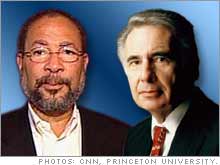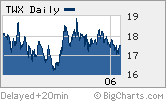|
Good times for Time Warner...
... but despite better-than-expected results, Icahn is expected to keep pressuring media company.
NEW YORK (CNNMoney.com) - Time Warner reported fourth-quarter results Wednesday that were better than Wall Street was expecting... but that may not be enough to silence the media company's biggest critic, activist shareholder Carl Icahn. Time Warner posted earnings per share of 29 cents. Excluding a one-time gain of 4 cents per share, profits were still well ahead of analysts' consensus estimates of 22 cents. Earnings rose 21 percent from a year ago. Sales increased 7 percent from a year ago to $11.9 billion, in line with Wall Street's expectations.
Time Warner is the parent company of CNNMoney.com. The company said that all of its businesses did well in the quarter but that the cable and network divisions performed the best, generating double-digit percentage gains in operating income from a year ago. The company's film studio division also reported solid gains in sales and profits. The AOL division, which many on Wall Street have viewed as a drag on Time Warner's results, posted a solid gain in profits thanks to higher online advertising revenues. Revenues fell from a year ago, however, as AOL continues to lose subscribers. "I'm pleased with our Company's 2005 financial performance that drew strength from across our businesses," Time Warner Chairman and Chief Executive Officer Dick Parsons said in a written statement. Investors seemed to be fairly impressed with the results. Shares of Time Warner (Research) rose nearly 2.5 percent in early morning trading on the New York Stock Exchange Wednesday. The stock fell nearly 10 percent in 2005 due to investors' concerns about growth in the media sector and has been relatively flat so far this year. Laura Martin, an analyst with Soleil/Media Metrics, said that Wall Street may be skeptical of Time Warner's results because it appeared that a lower-than-expected tax rate was a big reason why earnings came in ahead of forecasts. That's the opposite of what happened to search engine Google (Research), which reported its first earnings miss as a public company Tuesday due primarily to a higher-than-anticipated tax rate. In addition, Martin said that Wall Street may be disappointed with Time Warner's guidance for 2006. The company said that it expects its adjusted operating income before depreciation and amortization (OIBDA), another measure of profitability that Wall Street views closely, to increase in the high-single digits from 2005's $10.3 billion level. But Martin said she's expecting OIBDA to come in at $11.4 billion this year, an increase of 11 percent. And according to Thomson First Call, the consensus estimate for this year is $11.7 billion. Susan Kalla, an analyst with Caris & Co. added that Time Warner may have difficulty continuing to generate strong gains in cable subscribers as phone companies become more competitive. She also said that the company's planned increase in capital expenditures was "alarming." "The upside we saw in cable is not sustainable, because there will be pressure in the digital phone business," Kalla said. "The reaction on Wall Street was a little too positive." Fighting Icahn and media malaise
Investors in Time Warner and other media stocks such as Walt Disney (Research), Viacom (Research) and News Corp. (Research) have expressed worries about the future of the sector due to declining movie attendance last year, a slowdown in DVD sales and fears of continued migration of advertising dollars from traditional forms of media like radio, TV and print to the Internet. But during a conference call with analysts, Parsons said that Time Warner's main priorities for the year were to improve the competitive position for all of the company's media businesses online, with a particular focus on enhancing AOL's profile. Parsons added that the company also planned to step up its pace of buying back its own stock since shares have been beaten down so much. The company said that it has already repurchased stock worth $3 billion since announcing its $12.5 billion buyback program last year and will double the pace of its buybacks during the next three months. "Secular concerns that have weighed on media stocks and ours in particular are overblown," Parsons said. One fund manager who owns the stock said he likes the fact that Time Warner has continued to buy back stock and reduce debt. "Time Warner is a very diverse media company that has generated strong free cash flow and they continue to return cash to shareholders," said Ed Maraccini, portfolio manager with Johnson Asset Management, a mutual fund firm that bought shares of Time Warner in early October. And Time Warner, like many of its major media brethren, has taken steps to combat the perception that its prospects are declining. Last week, for example, Time Warner announced that it would merge its struggling WB network with CBS (Research)-owned UPN this September in hopes of boosting ratings. The new network, to be called the CW, will target 18-34 year olds, a demographic that is highly sought after by advertisers. And in December, Time Warner agreed to sell a 5 percent stake in its AOL unit to search engine Google for $1 billion. Still, despite the improvement in Time Warner's results, Kalla said the company is likely to face continued pressure from Icahn, who leads a group that owns about 3 percent of the company's stock. She added that the single-digit growth that Time Warner promised could be improved if the company made some changes. Icahn, in conjunction with investment bank Lazard (Research), is expected to soon release a report detailing plans to boost shareholder value at the company. Among some of the remedies Icahn is expected to propose are a full spinoff of the company's cable division, sales or spinoffs of Time Warner's publishing and AOL access units, an increase in the company's stock buyback plan and substantial cost-cutting measures. During the call, Parsons stressed that the company still had plans to sell only a minority interest in Time Warner Cable to the public. In addition, Icahn announced Monday that veteran media executive Frank Biondi has joined his effort to shake up Time Warner. Icahn said that if his attempt to wrest control of the company through a proxy fight is successful, Biondi will become CEO of Time Warner. Parsons defended his management team and the company's strategy during the call, however. He said that Time Warner would not "experiment with the flavor of the day just because it might work" or make decisions out of impatience. But Maraccini said some of Icahn's proposals could make sense and boost the stock price. So he views Icahn's involvement as a "bonus" that could help lift the stock price. _________________ For a look at Google's shocking earnings miss, click here. For more about media mergers, click here. Analysts quoted in this story do not own shares of Time Warner and their companies do not have an investment banking relationship with the company.
The reporter of this story owns shares of Time Warner through his company's 401(k) plan. |
|



